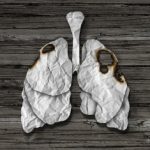 Pneumonia risk varies with vitamin D and E levels, smoking, and exercise. The findings come from researchers at the University of Finland who uncovered that low vitamin D serum levels are a risk factor for pneumonia. The researchers found that the risk of contracting pneumonia was 2.5 times greater in individuals with low vitamin D levels.
Pneumonia risk varies with vitamin D and E levels, smoking, and exercise. The findings come from researchers at the University of Finland who uncovered that low vitamin D serum levels are a risk factor for pneumonia. The researchers found that the risk of contracting pneumonia was 2.5 times greater in individuals with low vitamin D levels.
The study involved 1,421 people living in Eastern Finland. The serum vitamin D3 levels were measured in participants’ blood samples drawn in 1998 to 2001, and the results were compared to pneumonia cases in hospital records in the same set of subjects in 1998 to 2009. Those with serum vitamin D3 levels in the lowest third had 2.5 times greater risk of pneumonia, compared to those with the high levels of vitamin D3.
Advertisement
Additionally, smoking was also found to have an effect on pneumonia risk. The risk of developing pneumonia was higher in men than women, and grew with age.
The authors concluded, “Improved understanding of vitamin D and its role in immunity may lead to better ways to prevent and/or treat pneumonia. We now need to investigate whether vitamin D supplements could be a useful addition to pneumonia treatment and whether using supplements could help to prevent or reduce the severity of pneumonia among high-risk populations.”
Recommended vitamin D intake for Finnish people is 20 micrograms for adults over the age of 60.
Vitamin E supplementation may increase risk of pneumonia, depending on smoking and exercise
An alternative study found that smoking and exercise may affect the way vitamin E impacts the immune system. Vitamin E is known to have a boosting effect on the body’s protective mechanisms, helping ward off infection. However, vitamin E was found to either increase or decrease one’s risk of developing pneumonia, depending on the smoking status and level of exercise.
The researchers looked at 29,133 participants of which 833 developed pneumonia. Although vitamin E generally did not affect pneumonia risk, the risk of pneumonia decreased by 69 percent in those who exercised and were least exposed to smoke. On the other hand, pneumonia risk increased by 79 percent in those with the highest exposure to smoke and no exercise.
The researchers concluded that the role of vitamin E in susceptibility to pneumonia in physically active nonsmokers warrants further study.
Risk factors for pneumonia
 Aside from vitamin levels affecting the risk of pneumonia, there are other risk factors that can increase the odds of developing the condition. Many of the risk factors for pneumonia are modifiable, meaning you can actively take steps in reducing your risk. Risk factors for pneumonia include:
Aside from vitamin levels affecting the risk of pneumonia, there are other risk factors that can increase the odds of developing the condition. Many of the risk factors for pneumonia are modifiable, meaning you can actively take steps in reducing your risk. Risk factors for pneumonia include:
- Being exposed to smoke and smoking
- Having another medical condition, especially a lung or respiratory disease
- Being younger than the age of one or over the age of 65
- Having a weakened immune system
- Taking certain medications like proton pump inhibitors
- Drinking excessive amounts of alcohol
- Having had a cold or flu recently
Modifying controllable risk factors is an easy way to start reducing your risk of pneumonia and avoid any complications. Also read further on is pneumonia contagious?
Related Reading:
Bronchitis vs. pneumonia, differences in symptoms, causes, and treatments
Bronchitis and pneumonia are two respiratory conditions that at first may appear to be the same, but there are unique differences distinguishing the two. In both conditions, inflammation is present, but for bronchitis it is inflammation of the bronchi, and in pneumonia it is inflammation of the lungs. Continue reading…
Advertisement
Walking pneumonia (atypical pneumonia) symptoms, causes, and treatment
Walking pneumonia (atypical pneumonia) is a type of pneumonia, an illness that affects the upper and lower respiratory tract. The term walking pneumonia comes from the fact that many patients who have the condition don’t even realize it because their day-to-day living is not affected. Continue reading…
Sources:
http://ca.wiley.com/WileyCDA/PressRelease/pressReleaseId-96537.html
https://www.sciencedaily.com/releases/2013/04/130430091640.htm
https://www.sciencedaily.com/releases/2011/02/110217104951.htm
http://www.webmd.com/lung/tc/pneumonia-what-increases-your-risk
